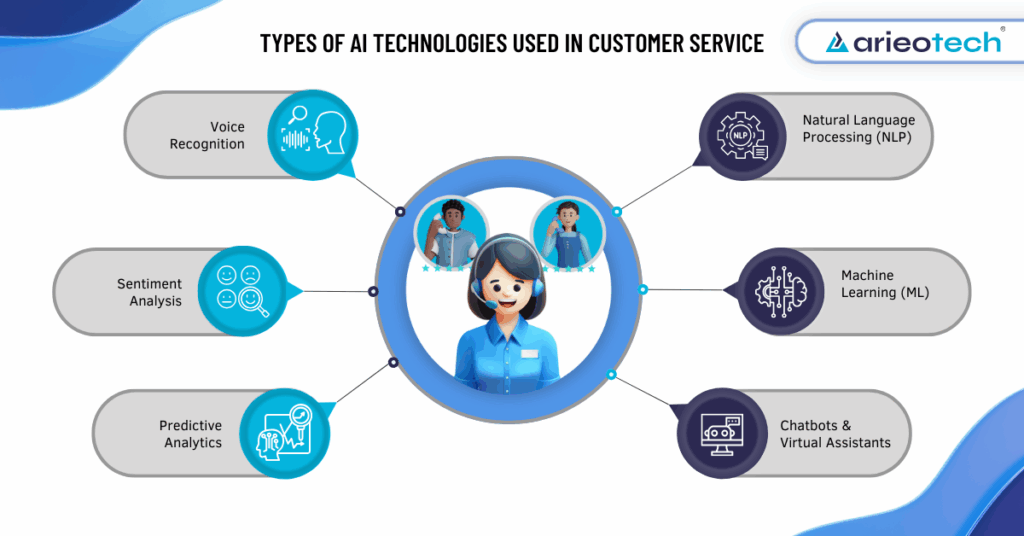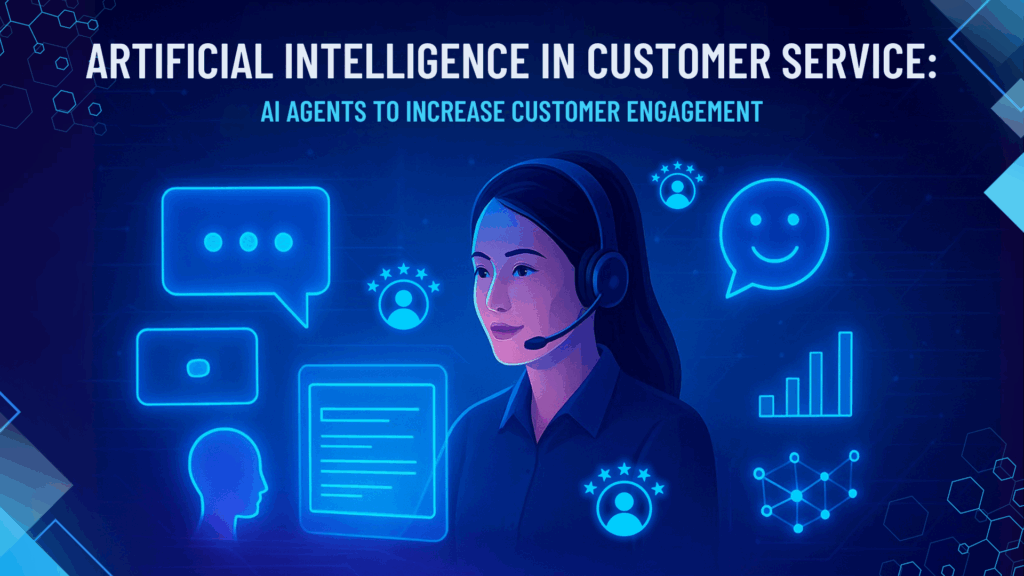Key Insights
- AI isn’t replacing human agents—it’s enhancing them by handling repetitive queries so humans can focus on complex issues.
- Predictive analytics enables businesses to anticipate customer needs, boosting loyalty and retention.
- Ethical deployment is not optional; compliance, transparency, and bias-free AI are critical for trust.
- Businesses adopting AI now are positioning themselves ahead of competitors in efficiency, cost savings, and customer satisfaction.
AI in Customer Service: How AI Agents improve customer engagement
AI has transformed customer service from a passive business function into one teeming with potential for bottom-line growth. In the past, customer service was mainly reactive. With the advent of AI tools, it is now characterized by instant responses, scalable systems, and—perhaps most importantly—predictive management and sentiment analysis. In other words, customer service has become a proactive part of acquiring, securing, and retaining customers.
According to a Salesforce survey of over 2,000 sales and service professionals, “84% of salespeople using generative AI say it helps increase sales at their organization by enhancing and speeding up customer interactions.”
Similarly, Drew Kraus, VP Analyst in the Gartner Customer Service and Support practice, states that the impact of Gen AI on customer experience cannot be overstated. In fact, in the same report—which shares the results of a Gartner poll—38% of leaders say improving customer experience and retention is the primary purpose of Gen AI initiatives.
Much of this Gen AI adoption in customer service is driven by the inefficiencies of older processes that relied solely on human agents. These systems often led to long wait times, overworked support teams, and frustrated customers. With the support of intelligent AI agents, however, customer service teams can actively monitor potential issues, address them quickly, speed up routine queries, and stay alert to risks in communication. The result? Customer service becomes not just a support function, but a driver of loyalty and satisfaction.
Specific Applications of AI in Customer Service: What AI Agents Do
While Gen AI refers broadly to artificial intelligence systems that generate content across media, in customer service it is the Gen AI subset of Large Language Models (LLMs) that are particularly useful.
LLMs are artificial intelligence models trained on large datasets, allowing them to generate text that mimics the data they were fed. These are the models that power AI customer support chatbots. AI agents, therefore, are software systems designed to interact with customers in a human-like way. They can answer routine questions, guide users through tasks, and even detect customer sentiment based on words or tone.

Here’s how they help in practical terms:
- Automate common questions
Simple queries like “What are your opening hours?” or “How do I reset my password?” are answered instantly, freeing human agents for more complex work.
- Give tailored responses
Using past interactions and customer data, AI offers answers that fit each customer’s situation rather than a one-size-fits-all reply.
- Spot issues early
By noticing patterns—for example, a sudden increase in delivery delays—AI alerts the team before complaints pile up.
- Read the room
Sentiment analysis enables AI to pick up on frustration or confusion in real time, prompting a more empathetic or urgent response.
How “HelpMate AI” Became ShopSphere’s 24/7 Concierge
Every big sale turned ShopSphere’s support desk into chaos: hours-long queues, unanswered late-night messages, and frustrated repeat customers.
Then came HelpMate AI. Overnight, it delivered instant, round-the-clock replies to thousands of shoppers, remembered past issues, and flagged problems before they escalated. Requests were routed directly to the right team, and automated check-ins kept customers happy post-purchase.
By the next sale, ShopSphere scaled effortlessly—no extra hires, fewer “how do I…?” questions, and a smoother shopping journey.
In 6 months:
- Satisfaction rose from 78% to 94%
- First-response time dropped from 12 hours to under 2 minutes
- Costs fell by 35%
Benefits of AI Agents in Customer Service
From answering questions in seconds to spotting problems before they grow, AI agents make customer service faster, smoother, and more reliable. Key benefits include:
- Instant responses – AI replies immediately, no matter the volume of queries.
- 24/7 availability – Customers receive support at any hour without requiring night shifts.
- Personalized interactions – AI remembers past conversations and tailors answers to each customer.
- Early problem detection – AI spots unusual trends (e.g., repeated issues) before they escalate.
- Smarter knowledge management – AI organizes and tags information for easy access.
- Intelligent routing of requests – Each query goes to the most suitable person or team.
- Automated follow-up – AI checks in post-resolution to ensure ongoing satisfaction.
- Scalability – Whether handling 10 or 10,000 questions, AI scales without extra hiring.
- Virtual assistant agents – AI guides customers step by step through processes like ordering or setup.
How to Get Started with AI in Customer Service
- Assess your needs and set clear goals
Decide what you want AI to do—whether it’s handling FAQs, providing tech support, or reducing wait times.
- Consult with specialists if needed
If your team lacks the technical skills, work with experts who can guide implementation.
- Implement the right tools and systems
Choose AI solutions that align with your business size, budget, and customer needs.
- Track progress with measurable results
Monitor metrics such as response time, issues resolved, and customer satisfaction.
- Keep improving using feedback
Continuously refine the system based on input from customers and staff.
Conclusion
AI agents are redefining customer service. From faster responses to proactive problem-solving, they can transform support from a cost center into a growth driver. The key lies in implementing them strategically, ensuring they align with business needs and deliver measurable results.
If you’re ready to explore how AI-powered customer service can work for your organization, the team at arieotech can help you plan, build, and deploy the right solution for lasting impact.
FAQs
Will AI replace human agents?
No. AI is best for repetitive, straightforward tasks. Human agents are still needed for complex situations, emotional conversations, and cases that require personal judgment.
Is AI expensive to implement?
Costs depend on the tool and the scale. Many small businesses start with affordable AI chat tools and expand as they see results.
How quickly can we see results?
Faster replies can happen immediately. Improvements in customer satisfaction or resolution rates may take a few months.
How do I know if my customer service team is ready for AI?
If your team spends a lot of time on repetitive questions, struggles with peak-hour volumes, or has long wait times, AI can help ease the load.
Which industries benefit most from AI in customer service?
While any industry can use it, e-commerce, banking, telecom, travel, healthcare, and SaaS often see the biggest gains due to high interaction volumes.
What challenges should I expect when implementing AI?
Possible hurdles include incomplete customer data, integration issues, and resistance from staff. Training and a gradual rollout can reduce these risks.
How long does implementation usually take?
Basic AI chat assistants can be set up in weeks. Advanced, fully integrated systems—especially those linked to CRMs or ticketing tools—may take 3–6 months.
What KPIs should I track after implementation?
Monitor response time, first contact resolution rate, customer satisfaction score (CSAT), and the percentage of queries handled by AI without escalation.





